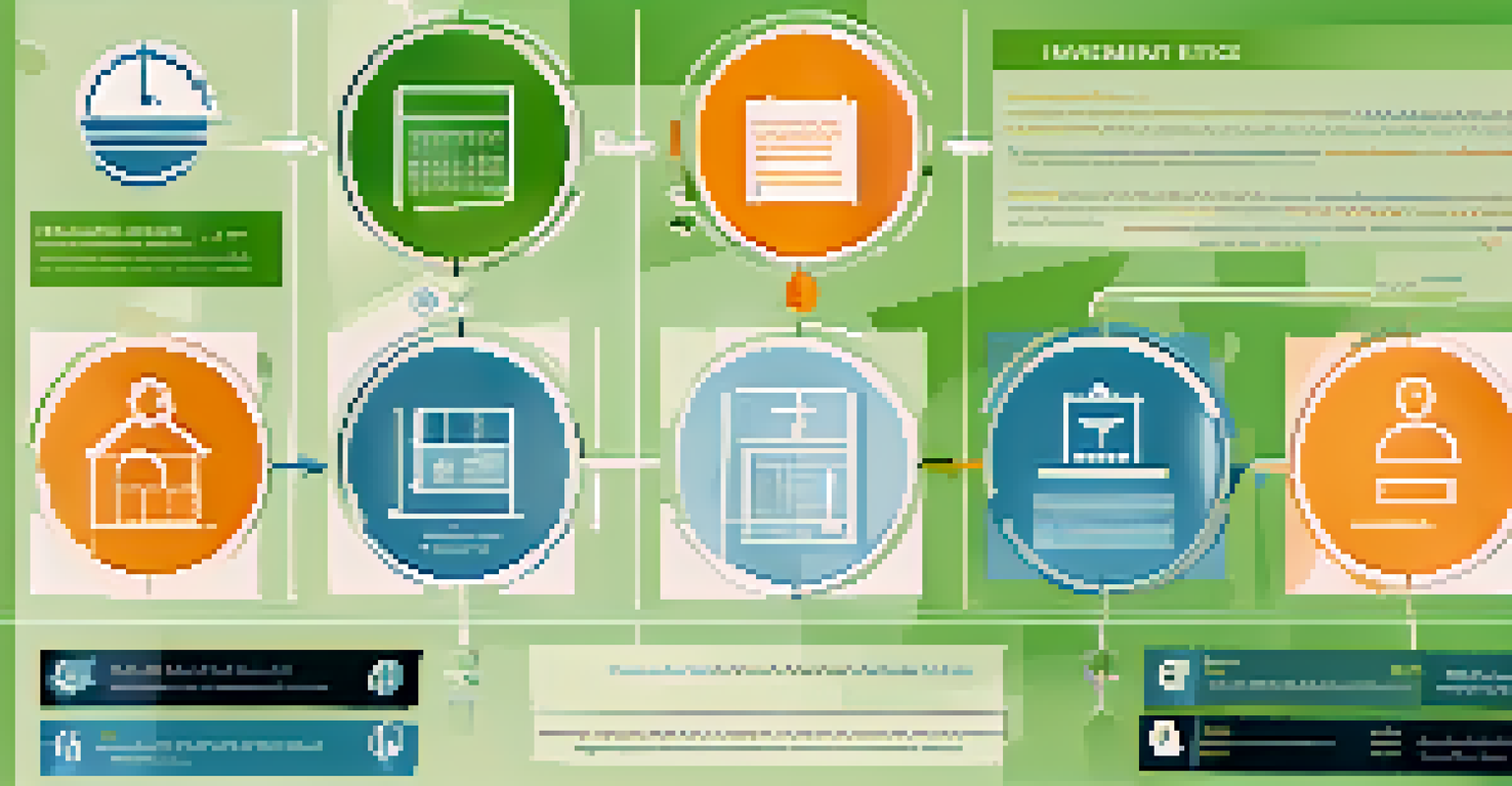Investment Ethics: Building Trust and Credibility

Understanding Investment Ethics and Its Importance
Investment ethics revolves around the principles that guide the behavior of investors and financial professionals. It’s crucial to recognize that ethical practices not only protect investors but also contribute to the stability of the entire financial system. Think of it as the moral compass that helps navigate complex financial waters, ensuring decisions are made with integrity and respect for all stakeholders.
It's not whether you win or lose, it's how you play the game.
When investors engage ethically, they foster trust, which is essential for the smooth operation of markets. Trust encourages participation and investment, creating a healthy environment for capital flow. In contrast, unethical behavior can lead to scandals that shake confidence and can have far-reaching repercussions across sectors.
Moreover, ethical investment practices can enhance a firm's reputation, attracting both clients and top talent. When companies are known for their integrity, they often find it easier to build lasting relationships with customers and employees alike, leading to sustained success in the long run.
The Role of Transparency in Investment Ethics
Transparency is a cornerstone of ethical investment practices. It involves open communication about risks, fees, and investment strategies, allowing investors to make informed decisions. Imagine buying a car; you’d want to see all its features and understand any hidden costs before making a purchase, right? The same principle applies to investments.

When firms prioritize transparency, they not only comply with regulations but also build trust with their clients. Investors who feel informed are more likely to have confidence in their financial advisors and the products they choose. This trust is fundamental, as it leads to stronger client relationships and ultimately, better financial outcomes.
Ethics Foster Trust in Investing
Ethical investment practices build trust among investors, which is essential for a stable and effective financial market.
However, transparency goes beyond just sharing information; it requires a commitment to honesty and integrity. Firms must be willing to admit mistakes and rectify them promptly, which reinforces their credibility in the eyes of investors. This culture of openness cultivates a positive environment where ethical practices can thrive.
The Impact of Corporate Governance on Investment Ethics
Corporate governance refers to the systems and processes by which companies are directed and controlled. Good governance ensures that companies operate ethically and in the best interests of all stakeholders, including investors, employees, and the community. Think of it as the framework that holds a company accountable for its actions.
The greatest danger in times of turbulence is not the turbulence; it is to act with yesterday's logic.
Strong corporate governance can significantly enhance ethical standards within an organization. When companies establish clear policies and a robust oversight structure, it minimizes the risks of unethical behavior. For instance, having independent board members can provide unbiased perspectives, helping to keep the company's actions in check.
Moreover, effective governance can lead to a competitive advantage. Companies known for their strong ethical standards attract investors who are increasingly looking for socially responsible investment opportunities. This alignment of values can strengthen brand loyalty and promote long-term success.
The Importance of Ethical Investment Strategies
Ethical investment strategies prioritize not just financial returns but also social and environmental impact. This approach reflects the growing awareness among investors about the consequences of their financial choices. For instance, choosing to invest in renewable energy companies supports sustainable practices while potentially yielding attractive returns.
These strategies encourage investors to consider the broader implications of their investments. By aligning their portfolios with their personal values, investors can contribute to positive change while still pursuing financial goals. It's a win-win situation that resonates well with the increasing demand for responsible investing.
Transparency Enhances Investor Confidence
Open communication about risks and fees allows investors to make informed decisions, strengthening relationships with financial advisors.
However, ethical investing isn't just about avoiding harmful industries; it also involves actively seeking out companies that promote positive practices. This proactive approach fosters innovation and encourages businesses to adopt sustainable and ethical practices, ultimately leading to a more responsible economy.
Building Trust Through Ethical Communication
Effective communication is vital in building trust, especially in the investment sector. Ethical communication involves being clear, honest, and transparent about investment products and strategies. It's about ensuring that clients fully understand what they are getting into, much like explaining the terms of a loan before signing the dotted line.
When clients feel informed and respected, they're more likely to trust their advisors and make sound investment decisions. This trust serves as the foundation for long-lasting relationships, which are crucial in an industry where reputation is everything. A trustworthy advisor will not only guide clients through complex markets but also stand by them in challenging times.
Moreover, ethical communication extends beyond initial interactions; it requires ongoing dialogue. Regular check-ins and updates keep clients informed and engaged, reinforcing their confidence in your guidance. This continuous engagement is key to maintaining trust and credibility in the ever-evolving financial landscape.
The Consequences of Unethical Investment Practices
Unethical investment practices can have serious repercussions for both individuals and the broader market. When investors engage in deceitful behaviors, such as insider trading or misrepresentation, it undermines the integrity of the financial system. Imagine a game of poker where one player cheats; it ruins the trust and enjoyment of the game for everyone involved.
The fallout from unethical practices can lead to significant financial losses, legal penalties, and damage to reputations. Scandals can prompt regulatory changes, leading to stricter compliance requirements that may stifle innovation. Furthermore, a loss of trust in the market can deter new investments, ultimately harming economic growth.
Corporate Governance Ensures Integrity
Strong corporate governance establishes accountability and ethical standards, attracting socially responsible investors and promoting long-term success.
In contrast, adhering to ethical practices fosters a more resilient and trustworthy investment environment. By prioritizing integrity, investors and firms can help cultivate a financial ecosystem where everyone benefits. This commitment to ethics is not just a legal obligation; it’s a moral one that can shape the future of investing.
Promoting a Culture of Ethical Investing
Creating a culture of ethical investing begins with education and awareness. Financial institutions and advisors should prioritize training programs that emphasize the importance of ethical practices in investment decisions. Just as schools teach children about honesty and integrity, the financial sector must instill these values in its professionals.
Moreover, leadership plays a crucial role in shaping this culture. When leaders model ethical behavior and make it a core organizational value, it sets the tone for everyone in the company. Employees are more likely to follow suit when they see their superiors making ethical choices, fostering a positive ripple effect throughout the organization.

Finally, engaging with clients about ethical investing options can further promote this culture. By discussing the benefits of responsible investing and offering opportunities to align investments with personal values, firms can help clients make informed choices that reflect their beliefs. This approach not only strengthens client relationships but also contributes to a more ethical financial landscape.